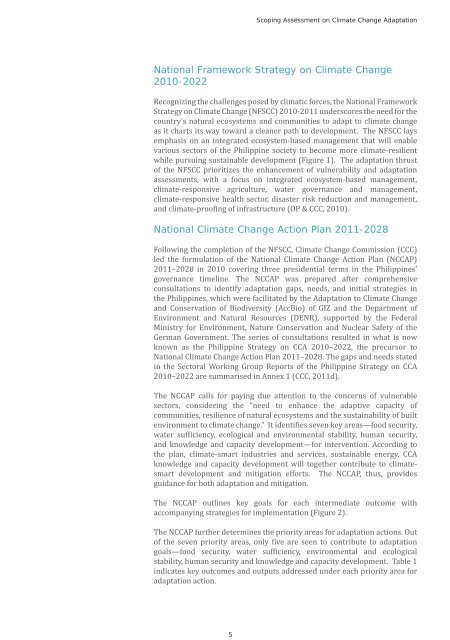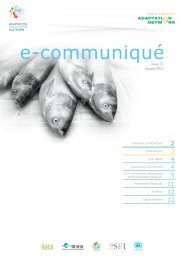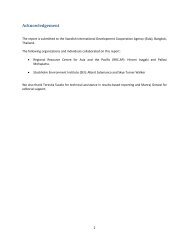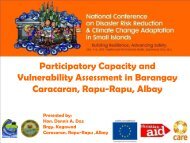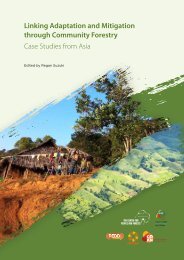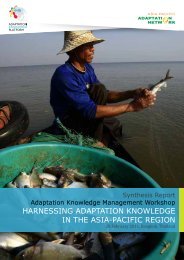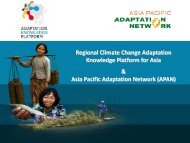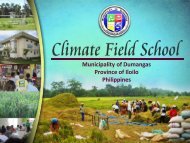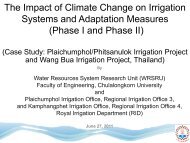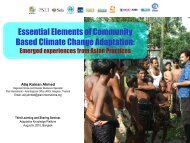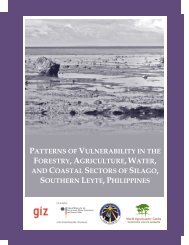Scoping Assessment on Climate Change Adaptation in the Philippines
Scoping Assessment on Climate Change Adaptation in the Philippines
Scoping Assessment on Climate Change Adaptation in the Philippines
Create successful ePaper yourself
Turn your PDF publications into a flip-book with our unique Google optimized e-Paper software.
<str<strong>on</strong>g>Scop<strong>in</strong>g</str<strong>on</strong>g> <str<strong>on</strong>g>Assessment</str<strong>on</strong>g> <strong>on</strong> <strong>Climate</strong> <strong>Change</strong> Adaptati<strong>on</strong><br />
Nati<strong>on</strong>al Framework Strategy <strong>on</strong> <strong>Climate</strong> <strong>Change</strong><br />
2010-2022<br />
Recogniz<strong>in</strong>g <strong>the</strong> challenges posed by climatic forces, <strong>the</strong> Nati<strong>on</strong>al Framework<br />
Strategy <strong>on</strong> <strong>Climate</strong> <strong>Change</strong> (NFSCC) 2010-2011 underscores <strong>the</strong> need for <strong>the</strong><br />
country’s natural ecosystems and communities to adapt to climate change<br />
as it charts its way toward a cleaner path to development. The NFSCC lays<br />
emphasis <strong>on</strong> an <strong>in</strong>tegrated ecosystem-based management that will enable<br />
various sectors of <strong>the</strong> Philipp<strong>in</strong>e society to become more climate-resilient<br />
while pursu<strong>in</strong>g susta<strong>in</strong>able development (Figure 1). The adaptati<strong>on</strong> thrust<br />
of <strong>the</strong> NFSCC prioritizes <strong>the</strong> enhancement of vulnerability and adaptati<strong>on</strong><br />
assessments, with a focus <strong>on</strong> <strong>in</strong>tegrated ecosystem-based management,<br />
climate-resp<strong>on</strong>sive agriculture, water governance and management,<br />
climate-resp<strong>on</strong>sive health sector, disaster risk reducti<strong>on</strong> and management,<br />
and climate-proo<strong>in</strong>g of <strong>in</strong>frastructure (OP & CCC, 2010).<br />
Nati<strong>on</strong>al <strong>Climate</strong> <strong>Change</strong> Acti<strong>on</strong> Plan 2011-2028<br />
Follow<strong>in</strong>g <strong>the</strong> completi<strong>on</strong> of <strong>the</strong> NFSCC, <strong>Climate</strong> <strong>Change</strong> Commissi<strong>on</strong> (CCC)<br />
led <strong>the</strong> formulati<strong>on</strong> of <strong>the</strong> Nati<strong>on</strong>al <strong>Climate</strong> <strong>Change</strong> Acti<strong>on</strong> Plan (NCCAP)<br />
2011–2028 <strong>in</strong> 2010 cover<strong>in</strong>g three presidential terms <strong>in</strong> <strong>the</strong> Philipp<strong>in</strong>es’<br />
governance timel<strong>in</strong>e. The NCCAP was prepared after comprehensive<br />
c<strong>on</strong>sultati<strong>on</strong>s to identify adaptati<strong>on</strong> gaps, needs, and <strong>in</strong>itial strategies <strong>in</strong><br />
<strong>the</strong> Philipp<strong>in</strong>es, which were facilitated by <strong>the</strong> Adaptati<strong>on</strong> to <strong>Climate</strong> <strong>Change</strong><br />
and C<strong>on</strong>servati<strong>on</strong> of Biodiversity (AccBio) of GIZ and <strong>the</strong> Department of<br />
Envir<strong>on</strong>ment and Natural Resources (DENR), supported by <strong>the</strong> Federal<br />
M<strong>in</strong>istry for Envir<strong>on</strong>ment, Nature C<strong>on</strong>servati<strong>on</strong> and Nuclear Safety of <strong>the</strong><br />
German Government. The series of c<strong>on</strong>sultati<strong>on</strong>s resulted <strong>in</strong> what is now<br />
known as <strong>the</strong> Philipp<strong>in</strong>e Strategy <strong>on</strong> CCA 2010–2022, <strong>the</strong> precursor to<br />
Nati<strong>on</strong>al <strong>Climate</strong> <strong>Change</strong> Acti<strong>on</strong> Plan 2011–2028. The gaps and needs stated<br />
<strong>in</strong> <strong>the</strong> Sectoral Work<strong>in</strong>g Group Reports of <strong>the</strong> Philipp<strong>in</strong>e Strategy <strong>on</strong> CCA<br />
2010–2022 are summarised <strong>in</strong> Annex 1 (CCC, 2011d).<br />
The NCCAP calls for pay<strong>in</strong>g due attenti<strong>on</strong> to <strong>the</strong> c<strong>on</strong>cerns of vulnerable<br />
sectors, c<strong>on</strong>sider<strong>in</strong>g <strong>the</strong> “need to enhance <strong>the</strong> adaptive capacity of<br />
communities, resilience of natural ecosystems and <strong>the</strong> susta<strong>in</strong>ability of built<br />
envir<strong>on</strong>ment to climate change.” It identiies seven key areas—food security,<br />
water suficiency, ecological and envir<strong>on</strong>mental stability, human security,<br />
and knowledge and capacity development—for <strong>in</strong>terventi<strong>on</strong>. Accord<strong>in</strong>g to<br />
<strong>the</strong> plan, climate-smart <strong>in</strong>dustries and services, susta<strong>in</strong>able energy, CCA<br />
knowledge and capacity development will toge<strong>the</strong>r c<strong>on</strong>tribute to climatesmart<br />
development and mitigati<strong>on</strong> efforts. The NCCAP, thus, provides<br />
guidance for both adaptati<strong>on</strong> and mitigati<strong>on</strong>.<br />
The NCCAP outl<strong>in</strong>es key goals for each <strong>in</strong>termediate outcome with<br />
accompany<strong>in</strong>g strategies for implementati<strong>on</strong> (Figure 2).<br />
The NCCAP fur<strong>the</strong>r determ<strong>in</strong>es <strong>the</strong> priority areas for adaptati<strong>on</strong> acti<strong>on</strong>s. Out<br />
of <strong>the</strong> seven priority areas, <strong>on</strong>ly ive are seen to c<strong>on</strong>tribute to adaptati<strong>on</strong><br />
goals—food security, water suficiency, envir<strong>on</strong>mental and ecological<br />
stability, human security and knowledge and capacity development. Table 1<br />
<strong>in</strong>dicates key outcomes and outputs addressed under each priority area for<br />
adaptati<strong>on</strong> acti<strong>on</strong>.<br />
5


